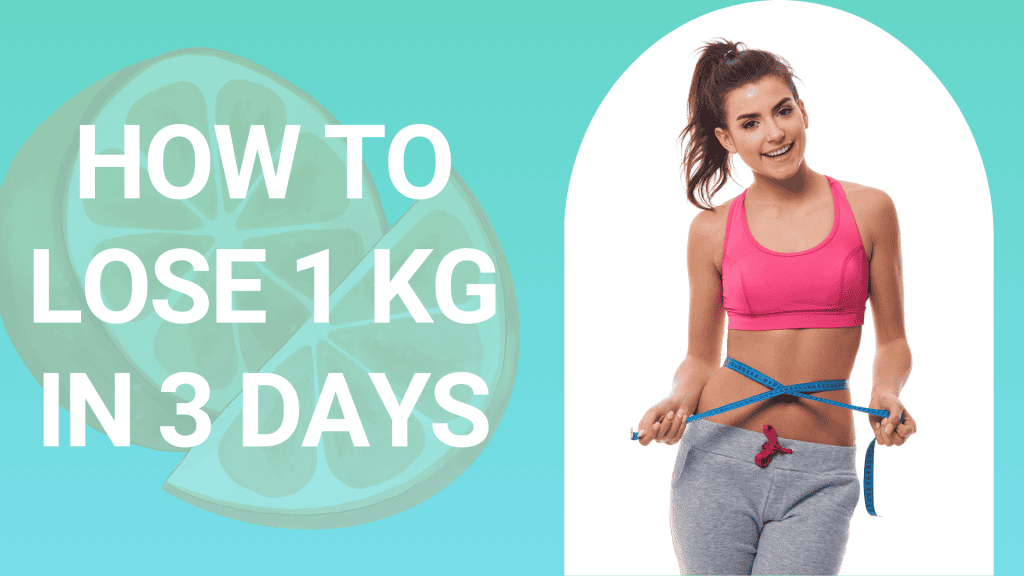Losing 1 kg in 3 days requires you to create a calorie deficit, which means burning more calories than you consume, and this weight loss requires a calorie deficit of about 2,500 calories daily to achieve the goal quickly. And, you can do this by eating less food, doing more physical exercise, or by combining both methods. However, losing 1 kg in 3 days is a simple goal that people can achieve when they begin their weight loss journey. Therefore, in this article, we will check all the details about how to lose 1 kg in 3 days.
Is it possible to lose 1 kg weight in 3 days?
Yes, losing 1 kg in 3 days is possible with high-calorie deficit and high-intensity exercises, which might be difficult to maintain and lead to negative health effects. Therefore, for sustainable and healthy weight loss, it is necessary to go for a weight loss of 1-2 kg per week. Because at this pace, your body is allowed to adjust, which helps to ensure that you are losing fat rather than muscle. So, to lose 1 kg in 3 days, it is crucial to maintain overall health and achieve long-term success, like How to get flat tummy without exercise.
How to Lose 1 kg in 3 Days: Proven Strategies
Losing 1 kg in 3 days sounds ambitious, but it’s absolutely doable and achievable with the correct methods. Here are the top 10 effective strategies backed by research and scientific data that can help you achieve this goal of how to lose 1 kg in 3 days.
- Follow a Calorie Deficit Diet: Eat 500-1000 fewer calories daily to shed 0.5-1 kg per week.
- Try Intermittent Fasting: Use methods like 16/8 or 5:2 to alternate eating and fasting periods.
- Reduce Carbohydrate Intake: Cut refined carbs to lose weight and reduce bloating quickly.
- Increase Protein Intake: Boost metabolism and lower calorie intake with protein-rich foods.
- Drink 5-7 Liters of Water Daily: Stay hydrated to feel full, boost metabolism, and cut water retention.
- Avoid Liquid Calories: Choose water, tea, or black coffee instead of sugary drinks and alcohol.
- Engage in Physical Activity: Perform 30 minutes of vigorous exercise daily, like HIIT.
- Monitor Sodium Intake: Limit sodium to avoid water retention and bloating.
- Get Adequate Sleep: Aim for 7-9 hours of quality sleep to support weight loss.
- Be Mindful of Portion Sizes: Eat smaller portions to manage calorie intake and prevent overeating.
1. Follow a Calorie Deficit Diet
One of the important principles of weight loss is consuming fewer calories than you burn, and to know How to calculate calorie requirement, you need to track your food intake while cutting down on 500-1000 calories per day. Hence, this will create a deficit that leads to weight loss of about 0.5 to 1 kg per week. According to studies, every pound of fat (about 0.45 kilograms) equates to roughly 3,500 calories, which means trimming 500-1000 calories daily should help you lose 1 kg in 3 days.
2. Try Intermittent Fasting
This method involves cycling between periods of eating and fasting, such as the 16/8 method, where you fast for 16 hours and eat within an 8-hour window, or the 5:2 approach, where you normally eat for five days and restrict calories to 500-600 on two non-consecutive days. This has shown significant weight loss benefits, and research also indicates that intermittent fasting can decrease body weight by 3-8% over several weeks and reduce visceral fat.
3. Reduce Carbohydrate Intake
Cutting back on carbs, especially refined ones, helps lose weight and reduce bloating. Carbohydrates hold onto water, about 3 grams per gram of carb. Studies reveal that low-carb diets can lead to more immediate weight loss compared to low-fat diets. Following a healthy and balanced diet plan with low calorie foods is crucial for losing 1 kg weight in 3 days.
4. Increase Protein Intake
Boosting your protein intake not only revs up your metabolism by 80-100 calories per day but also curbs cravings. Research shows that protein rich foods can reduce daily calorie intake by up to 441 calories and help maintain muscle mass during weight loss. Add lean meats, eggs, and legumes to your meals to reap these benefits. These dietary changes can be very effective and beneficial if you are trying to lose 1 kg in 3 days.
5. Drink 5-7 Liters of Water Every Day
Hydrating your body not only keeps you feeling full but also boosts your metabolism, which results in a healthy gut and detoxification of toxins from the body. Research indicates that drinking 500 ml of water can increase metabolic rate by 30% for about 30-40 minutes. This helps burn more calories and reduce water retention, which can mask weight loss.
6. Avoid Liquid Calories
Be mindful of what you drink; sugary beverages and alcohol are packed with unnecessary calories that keep you from filling you up. Opt for water, tea, or black coffee instead. For instance, a standard 12 oz soda can add up to 150 calories and 39 grams of sugar, reducing your weight loss efforts. Avoiding liquid calories also helps in How to lose belly fat in 3 days, which is helpful if you want to lose 1 kg in 3 days.
7. Engage in Physical Activity
Engaging in physical activities and exercise is key to burning extra calories, and one must do at least 30 minutes of vigorous exercise daily, like running or cycling. High-intensity interval training (HIIT) can help burn 25-30% more calories than other forms of exercise while also improving cardiovascular health and building muscle.
8. Monitor Sodium Intake
Excess sodium can lead to water retention and bloating, so try to opt for fresh foods over processed 1s and try to stay within the recommended daily sodium limit of 2,300 mg (preferably 1,500 mg for most adults). Reducing sodium intake helps people feel lighter and supports weight loss efforts.
9. Get Adequate Sleep
Quality sleep is crucial for weight management as it impacts hunger hormones like ghrelin and leptin. Research suggests that inadequate sleep can lead to increased fat retention and muscle loss during calorie restriction. Aim for 7-9 hours of sound sleep to support your weight loss goal to lose 1 kg in three days.
10. Be Mindful of Portion Sizes
Eating smaller portions can prevent overeating and keep your calorie intake in check. Research indicates that people consume up to 30% more food when given larger portions. Using smaller plates, measuring your servings, and avoiding eating straight from containers can help you stay on track.
Diet Plan to lose 1 kg in 3 days
Day 1
- Morning: Warm Water with Lemon
- Breakfast: Oats with nuts and seeds
- Mid-Morning Snack: 1 Apple or a handful of Almonds
- Lunch: Mixed Vegetable Salad, 1 cup of Brown Rice with Dal
- Evening Snack: Green Tea and Sprouts Salad
- Dinner: Grilled Paneer or Tofu with sautéed vegetables and Curd
- Before Bed: Warm Milk with turmeric
Day2
- Morning: Warm Water with Lemon
- Breakfast: Poha with vegetables
- Mid-Morning Snack: 1 Orange or a handful of Walnuts
- Lunch: Mixed Vegetable Salad, 1 Chapati with Vegetable Sabzi and Dal
- Evening Snack: Green Tea and Fruits (papaya, melon)
- Dinner: Grilled Fish or Chicken with steamed vegetables and Curd
- Before Bed: Herbal Tea
Day 3
- Morning: Warm Water with Lemon
- Breakfast: Upma with vegetables
- Mid-Morning Snack: 1 Banana or a handful of Pistachios
- Lunch: Mixed Vegetable Salad, 1 cup of Quinoa or Brown Rice with Chana Masala
- Evening Snack: Green Tea and Cucumber Slices
- Dinner: Mixed Vegetable Soup with black pepper
- Before Bed: Warm Milk
Foods to Avoid When Losing 1 kg in 3 Days
Losing 1 kg in 3 days requires a disciplined diet and nutrition, along with essential foods to avoid that can hamper your progress. These include sugary foods, refined carbohydrates, processed snacks, and fried foods. Understanding why these foods are harmful can help you make better dietary choices.
1. Sugary Foods
Sugary foods are those high in added sugars, such as candies, pastries, and sweetened beverages. These foods are high in calories and low in nutrients, which can lead to weight gain and hinder your weight loss efforts. If you’re trying to lose 1 kg in 3 days, avoiding sugary foods is essential. Consuming sugary foods causes a rapid spike in blood sugar levels followed by a quick drop, leading to increased hunger and cravings. A study found that high consumption of sugary beverages was associated with a 27% increased risk of obesity in adults and a 55% increased risk in children. Another study demonstrated that individuals who reduced their intake of added sugars experienced an average weight loss of 0.8 kg over ten weeks.
2. Refined Carbohydrates
Refined carbohydrates, including white bread, white rice, and pasta, have lost their natural fiber and nutrients. They cause blood sugar spikes and increased hunger, and while consuming them, your body quickly converts them into glucose, leading to an increase in blood sugar levels. In contrast, this will trigger the release of insulin, a hormone that facilitates fat storage, particularly around the abdomen. Moreover, the rapid digestion of refined carbs leaves you feeling hungry sooner, making it challenging to stick to a reduced-calorie diet. Research showed that diets high in refined carbohydrates were linked to a 36% greater weight gain and increased abdominal fat than diets low in refined carbs. Another study found that reducing refined carbohydrate intake resulted in a 16% decrease in hunger and a 2.5 kg weight loss over 12 weeks.
3. Processed Snacks
Processed snacks are pre-packaged and often include chips, cookies, and other foods high in salt, sugar, and unhealthy fats. These snacks are typically calorie-dense and low in nutritional value, and their high salt content leads to water retention, making it harder to lose weight quickly. Avoiding processed snacks is advisable to lose 1 kg in 3 days because the combination of sugar and unhealthy fats can harm your metabolism and may lead to overconsumption of calories. Further, a study found that consuming processed snacks was associated with a 23% higher overall calorie intake and poor diet quality, contributing to weight gain. Another study indicated that reducing the intake of processed foods, including snacks, led to a 1.7 kg greater weight loss over six months.
4. Fried Foods
Fried foods are those cooked in oil, such as French fries, fried chicken, and doughnuts. They are high in calories and trans fats, which are particularly harmful as they increase bad cholesterol levels (LDL) and lower good cholesterol levels (HDL), which can contribute to heart disease. The high-calorie content of fried foods makes it easy to exceed your daily calorie limit, thus preventing weight loss. Additionally, the trans fats in fried foods can interfere with your body’s ability to regulate weight by affecting hormones that control appetite and fat storage. According to research, frequent consumption of fried foods was linked to a 25% increased risk of obesity and a 37% increased risk of type 2 diabetes. Another study found that diets high in trans fats from fried foods were associated with a 48% higher rate of heart disease and a significant increase in weight gain over time.
How to Calculate Daily Calorie Intake to Lose 1 kg in 3 Days
To effectively calculate calories for rapid weight loss, you need a Daily calorie intake calculator, understanding your basal metabolic rate (BMR) is crucial. BMR represents the calories your body requires at rest to maintain basic physiological functions. Using the Harris-Benedict equation provides a reliable method to determine this:
The Basal Metabolic Rate (BMR calculator) is the amount of energy expended while at rest in a neutrally temperate environment, in the post-absorptive state (meaning that the digestive system is inactive, which requires about 12 hours of fasting in humans).
- For men: BMR = 88.362 + (13.397 × weight in kg) + (4.799 × height in cm) – (5.677 × age in years)
- For women: BMR = 447.593 + (9.247 × weight in kg) + (3.098 × height in cm) – (4.330 × age in years)
Example: Imagine a 35-year-old man weighing 75 kg and standing 175 cm tall. To calculate his BMR, we use the formula: BMR = 88.362 + (13.397 × 75) + (4.799 × 175) – (5.677 × 35) = 1,780.53 calories/day.
Creating a Caloric Deficit: To lose 1 kg in three days, you need to establish a significant caloric deficit of approximately 2,500 calories per day. This deficit can be achieved by reducing calorie intake and increasing physical activity.
Understanding your Basal Metabolic Rate (BMR) using the Harris-Benedict equation is essential for determining your daily calorie needs. To achieve rapid weight loss, you must create a daily caloric deficit of 2,500 calories.
Is it healthy to lose 1 kg in 3 days?
Losing 1 kg in 3 days is possible, but it’s typically not recommended because of the potential health risks involved, like rapid weight loss, which results in losing lean muscle mass and fat. A study found that when people lose weight quickly, they tend to lose more muscle mass than those who gradually lose weight. And muscle mass is crucial for maintaining your metabolism, so losing muscle can make it harder to lose weight over time. According to research, severe caloric restriction can result in vitamin A, D, E, calcium, and iron deficiencies. These nutrient deficiencies can cause various health problems, including weakened immune function, decreased bone density, and impaired cognitive function.
In conclusion, it is possible to lose 1 kg in 3 days, but it is not considered healthy due to the risks of muscle loss, nutrient deficiencies, metabolic slowdown, and psychological effects. A gradual weight loss of 0.5 to 1 kg per week is generally recommended for sustainable and healthy weight management. Following 30 30 30 rule for weight loss is a perfect and efficient way of losing weight without putting stress on your body.
Expert Review on How to Lose 1 kg in 3 Days
According to Dr Ken Berry, a well-respected nutritionist, the idea of losing 1 kg in 3 days sounds appealing, but it can also be harmful and rarely sustainable. Rapid weight loss methods often involve extreme calorie restriction or intense exercise, which might show quick results but can have serious drawbacks. Dr. Berry explains that when you drastically cut down your calorie intake, your body starts to break down muscle for energy. This muscle loss is not good because muscle is crucial for maintaining a healthy metabolism.
Moreover, Dr. Berry points out that extreme diets can slow down your metabolism, a condition known as adaptive thermogenesis. When your body isn’t getting enough calories, it tries to conserve energy by reducing the number of calories it burns at rest. This metabolic slowdown can persist even after you resume normal eating, making it much harder to maintain your weight loss. Dr Ken Berry also notes the psychological effects of rapid weight loss. Extreme dieting can lead to increased stress, anxiety, and an unhealthy preoccupation with food and body image. These psychological effects can, in turn, lead to eating disorders and disordered eating behaviours, as highlighted by the research.
References
Cox, Carla E. n.d. “Role of Physical Activity for Weight Loss and Weight Maintenance.” NCBI. Accessed July 11, 2024. https://www.ncbi.nlm.nih.gov/pmc/articles/PMC5556592/.
“Department of Nutrition | Harvard T.H. Chan School of Public Health.” n.d. HSPH.Harvard.edu. Accessed July 11, 2024. https://www.hsph.harvard.edu/nutrition/.
“Weight loss: 6 strategies for success.” 2024. Mayo Clinic. https://www.mayoclinic.org/healthy-lifestyle/weight-loss/in-depth/weight-loss/art-20047752.
FAQs
1. Can you lose 1 kg in 3 days?
Yes, you can lose 1 kg in 3 days by creating a significant calorie deficit through strict diet and exercise, but this primarily results in losing water weight and muscle mass rather than fat.
2. What is the quickest way to lose 1 kg?
Through diet and exercise, create a calorie deficit, aiming to burn 2,500 calories more than you consume daily. The quickest way to lose 1 kg is to consume low-calorie, nutrient-dense foods, avoid high-sodium items, and engage in aerobic exercises and strength training.
3. How quickly can you lose 1 kg?
Generally, it takes a deficit of 7,700 calories to lose 1 kg, achievable in about a week with a 1,100-calorie daily deficit. By maintaining a healthy calorie deficit of 500-1000 calories per day through a balanced diet and regular physical activity, you can expect to lose 1 kg in about 1 to two weeks.









